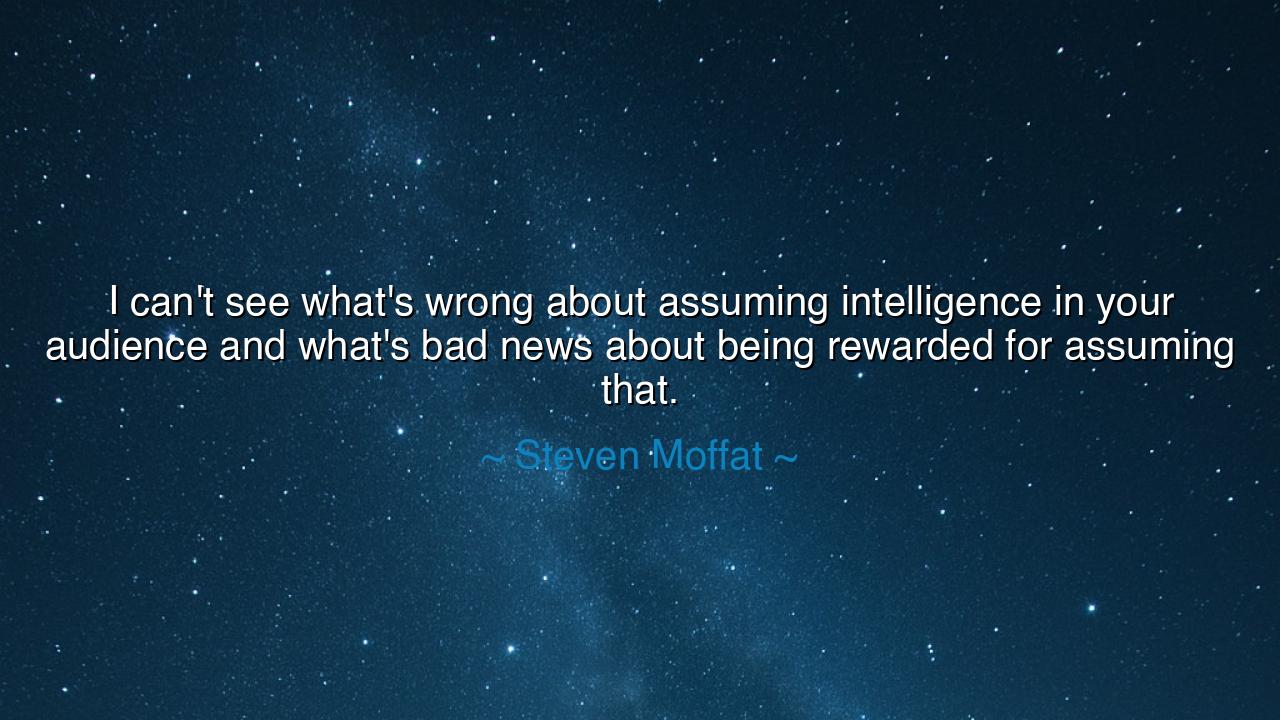
I can't see what's wrong about assuming intelligence in your
I can't see what's wrong about assuming intelligence in your audience and what's bad news about being rewarded for assuming that.






The words of Steven Moffat, “I can’t see what’s wrong about assuming intelligence in your audience and what’s bad news about being rewarded for assuming that,” ring like the voice of a teacher defending the sacred trust between the storyteller and the listener. Beneath their simplicity lies a noble creed: to respect the mind of others, to speak not down to them but across, as equals. Moffat, a creator of stories both intricate and profound, speaks here not merely of writing, but of the very nature of communication itself. His words rise against a world that too often chooses simplicity over depth, noise over nuance, and the easy applause of the crowd over the quiet honor of truth.
To assume intelligence in your audience is an act of faith—it is to believe that those who listen are capable of reflection, patience, and thought. It is to trust that within every soul lies the spark of curiosity, waiting to be kindled by meaning. Moffat’s defense of this belief is not the pride of a clever man, but the reverence of one who sees in others the same light he nurtures within himself. When he says he cannot see what is wrong with this assumption, he is rejecting the idea that the masses must be fed the simple, the shallow, the safe. Instead, he reminds us that to challenge the mind is to honor it, and to be rewarded for doing so is no shame—it is proof that humanity still hungers for wisdom.
This truth has been known since the dawn of civilization. The philosophers of Athens, the poets of Rome, the sages of China and India—all understood that the strength of a society rests upon the intelligence of its people and the courage of its teachers. When Socrates walked among his students, he did not lecture them with answers; he questioned them, provoked them, led them through the labyrinth of their own minds. He assumed their intelligence, even when they doubted it themselves. And though his questions unsettled the powerful, his method became immortal, for it recognized that the act of thinking is itself the highest form of human dignity.
In Moffat’s realm of storytelling—where he crafted the intricate worlds of Doctor Who and Sherlock—this philosophy took on a modern form. His tales did not spoon-feed; they invited the audience to engage, to piece together clues, to think as much as to feel. He respected his viewers enough to challenge them, to make them partners in the unfolding of the narrative rather than passive recipients of spectacle. When others warned that complexity might alienate the audience, he held fast to his belief: that intelligence, not simplicity, is what truly binds people to a story. The reward he speaks of is not mere popularity—it is the joy of seeing that the human spirit, when trusted, will always rise to meet the challenge.
Throughout history, those who dared to assume intelligence in their audience often faced resistance. Galileo spoke of the stars and was condemned; Da Vinci painted symbols that demanded contemplation; Beethoven composed symphonies that confounded his contemporaries. Yet time vindicated them all. Theirs was the same faith that Moffat expresses—the conviction that humanity is capable of more than comfort, that the mind longs not for ease but for elevation. To underestimate the intelligence of others is to betray that longing; to challenge it is to awaken it.
The lesson in Moffat’s words reaches far beyond art. In every conversation, in every teaching, in every act of communication, there lies a choice: to speak as though others are capable of understanding—or to speak as though they are not. When we assume ignorance in others, we diminish both them and ourselves. But when we assume intelligence—when we treat others as thinkers, as seekers, as equals—we create the conditions for growth, respect, and transformation. Whether one is a teacher before students, a parent before children, or a leader before the people, the principle remains the same: honor the mind of the listener, and you will elevate the soul of the world.
So, let this teaching pass from generation to generation: do not fear complexity, and never underestimate the minds around you. Speak with depth, write with courage, and act with faith in the intelligence of others. For when you challenge those who listen, you call forth their hidden brilliance. And when you are rewarded for that faith—as Moffat was—know that it is not vanity, but the rightful joy of communion between minds awakened together. To assume intelligence is to build civilization itself, for the measure of any age is not how loudly it shouts to the crowd, but how deeply it dares to speak to the wise within every human heart.






AAdministratorAdministrator
Welcome, honored guests. Please leave a comment, we will respond soon